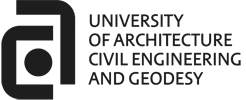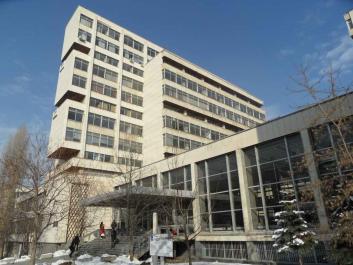1. The public mission of UACEG is secular and it is education- and research-oriented. Wide variety of architectural and civil engineering knowledge is acquired and practical skills are developed at the University in harmony with the local, European and global traditions as well as with the state policy for the higher education development in the Republic of Bulgaria. This mission is materialised in the course of the following degree programmes: Architecture, Structural Engineering, Hydraulic Engineering (Hydraulic Structures, Irrigation and Drainage Engineering), Water Supply and Sewerage, Geodesy, and Transportation Engineering (Road Construction, Railway Construction.
UACEG has rich traditions in the provision of academic knowledge and has always encouraged the ideas of democracy and academic autonomy. It is the oldest technical school in Bulgaria. Founded in 1942, at the beginning it offers two degree programmes - Structural Engineering and Surveying. In 1951 the State Technical School was transformed into State Polytechnics. In 1953 it was split into several higher educational institutions, one of them being the Institute of Civil Engineering. After 1977 the Institute's name was Higher Institute of Architecture and Civil Engineering (HIACE). With the Act of the National Assembly of 21 July 1995 HIACE was granted the statute of University of Architecture, Civil Engineering and Geodesy. The structure of the University is formed by five faculties: Architecture, Structural Engineering, Hydrotechnics, Geodesy, Transportation Engineering, and a number educational and administrative units.
The study at UACEG is eligible for applicants of all countries without privileges or restrictions such as: sex, religion, race, age, social status or views.
The full-time academic staff is 387, recruited by open competition.
2. The main objectives of UACEG are: to provide high-quality higher education in Architecture and Civil Engineering; to offer a rich choice of post graduate educational qualifications; to realise thorough scientific research and effective co-operation with national and international public and private institutions in the following fields:
2.1. Overall regional and urban planning, planning of complexes and functional zones, design of residential, public, industrial and agrarian buildings.
2.2. Calculation of stress and strain state in buildings and structures at various static and dynamic impacts as well as soil properties; design and dimensioning of bearing systems, performed in different building materials; implementing efficient building technology solutions as well as construction management techniques.
2.3. Design, construction and operation of hydropower systems and structures, dams, hydropower plants, reservoirs, irrigation and drainage, water-supply and sewerage systems, waste water treatment plants and landfills.
2.4. Carrying out geodetic, gravimetric, astronomic and photogrammetric measurements, vertical levelling, town plans, regional plans, cadastre plans, and all kinds of maps, atlases, and geographical globes.
2.5. Design, construction and maintenance of roads, railways, road and railway structures, bridges, tunnels, stations, airports, harbour and geotechnical structures; planning, organization and management of urban and interurban traffic.
Alongside with the technical aspects of the education, one of the aims of UACEG is to develop future architects, civil engineers and surveyors' skills to cope with large-scale construction projects in compliance with ecological requirements and provide non-conflicting development of built and natural environment.
The engineering education in UACEG is closely linked with financial, economic and social issues. Graduates will be responsible for significant material and financial assets, will develop and/or manage projects that require the involvement of numerous staff at different professional level. To meet the needs for such skills the curricula of all courses include subjects like macro- and micro-economics, business administration, information technologies, legal aspects of engineering activities.
The cultural and humanitarian aspects of the education at UACEG presume attendance of courses in foreign languages, philosophy, and psychology. Furthermore, participation in joint projects under such European programmes like PHARE, TEMPUS, INCO-COPERNICUS, CEEPUS as well as SOCRATES and LEONARDO contributes to the same aspect aimed eventually at the graduates to successfully pursue their careers in international environment.
The ancient concept "Mens sana in corpore sano" is reflected in the curricula. The sports facilities of the University are extensively used both for regular classes of physical training and for additional sports and recreation activities.
It has been a constant policy of the UACEG's management body to attract as many international students as possible. Today, the University is with the highest number of international students (mainly from the Balkans, Middle East and Northern Africa) among the engineering educational institutions in the country. This is a sign of international recognition of the University's level of education and at the same time paves the way to future better international co-operation in the field.
3. The formulated above mission and objectives of UACEG are in conformity with the type of the institution, its subject and the contents of its activities. They correspond to the social and public demands as well as to the state policy in the higher engineering education. The proof is at the constant interest toward UACEG among the potential applicants. The enrolment is based in an entry examination and the number of applicants is usually 3-5 times higher than the annual enrolment capacity.
4. The mission and objectives of UACEG are published in:
a) Internet - http://www.uacg.bg/
b) the Guide for Applicants 1998/1999
c) the objectives of UACEG in the individual subject fields are included in the faculty handbooks for 1997/1999 (in Bulgarian and English)
d) prospectuses and separate editions related to anniversaries.
Various information on the condition, achievements and problems of UACEG in the academic and research activities has been delivered to the printed and electronic media in the country by members of the University management staff.
5. The professional career of the graduates is the best judgement of the quality of education in UACEG. A great number of them are working as designers, researchers, lecturers and managers both in Bulgaria and in numerous countries in Europe, Asia, Africa and America.

